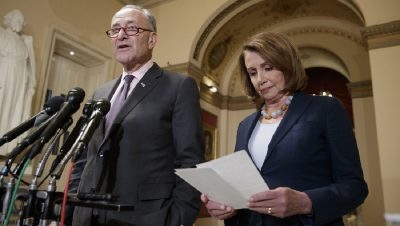Survival of ObamaCare is nothing to celebrate
Democratic politicians are giddily celebrating that the Affordable Care Act – more commonly known as ObamaCare – will remain in place for now, even though it continues to wreak havoc on U.S. health care.
Care Act – more commonly known as ObamaCare – will remain in place for now, even though it continues to wreak havoc on U.S. health care.
As they toast each other’s success at blocking reforms, let’s consider what they are celebrating:
- An explosion of health insurance premiums caused specifically by ObamaCare regulations. From the law’s implementation until this year, average health insurance premiums have doubled on individuals and increased 140 percent on families. At the same time, deductibles have also increased by about one-third for individuals and doubled for families, according to eHealth.
- A ten-fold increase in the projected number of people kicked off their chosen health plan, as compared to the initial estimates by the Congressional Budget Office when the law passed.
- A shrinking number of doctors and hospitals accepting ObamaCare insurance, with 32 to 42 percent fewer doctors than those who accept insurance off ObamaCare exchanges – and sometimes down to zero specialists available for stroke and other critical care.
- A drastic loss of insurance choices for those dependent on ObamaCare exchanges, with about one-third of counties now having only one insurance “choice” and another third having only two. That’s down from 2015, when 65 percent had three or more choices, according to Kaiser Foundation data.
- A taxpayer burden of $1 trillion for an expansion of Medicaid, the government insurance program for the poorest Americans. Medicaid is only accepted by half of doctors, and data from the U.S. Department of Health and Human Services revealed that half of doctors signed up to accept Medicaid patients actually do not do so. Studies show that Medicaid delivers worse outcomes than private insurance covering medically similar patients. These worse outcomes include more in-hospital deaths and adverse events, more complications from surgery, shorter survival after treatment and longer hospital stays. This proves once again that giving someone insurance is not the same as access to quality health care.
- An unprecedented, harmful consolidation of doctor practices and hospitals accelerated by ObamaCare regulations, as reported in the New England Journal of Medicine. This consolidation creates monopolies, thereby eliminating choice and competition. Reducing the cost of health care itself is the critical pathway to broader access to quality medical care, lower insurance premiums and ultimately better health. Consolidation does the opposite and raises prices for patients by over 20 percent, according to the Robert Wood Johnson Foundation. Consolidation raises prices by 34 percent for specialist care, as reported by Cory Capps and others in a studyfor the Northwestern Institute for Policy Research. This amounts to an extra $1,200 to $1,700 per patient per year, according to a study for the Journal of American Medicine Network by James. C. Robinson and Kelly Miller,
Meanwhile, Americans, not politicians, continue to be the victims of the imploding Affordable Care Act. Many of these same politicians insist that yet more government control is the solution, even pushing for a single-payer system.
Advocates of single-payer government health insurance ignore the overwhelming body of peer-reviewed facts that proves U.S. health care has been superior to every centralized system in the world. That means better access to care in our country than in single-payer systems, even for those needing “urgent treatment.”
For example, for people already diagnosed with cancer, 18 percent wait more than two months for physician-requested “urgent treatment” in England through the National Health Service. Britain’s National Health Service also reports that when brain surgery is recommended for patients, 17 percent wait more than 18 weeks.
In America we also benefit by faster availability of medications. In addition, there are factually superior outcomes for Americans from virtually all serious diseases, including cancer, heart disease, stroke, high blood pressure, and diabetes.
Voters must not allow our elected officials to blindly ignore the dismal projections about the unsustainable fiscal burden of taxpayer-funded health care, particularly as the impending explosion of demand for costly medical care that our society faces comes into play in the years ahead.
We must not allow politicians to deny virtually all the fundamentals of basic economics – that incentives, competition, and consumer power drive prices lower.
And finally, we must not allow our government to disregard all the historical proof that free market competition actually works to lower medical care prices without harming patients.
The way to bring down health care prices while maintaining quality and without limiting access is clear-cut. It requires facilitating competition among providers, and incentivizing consumers to seek value. Without recognizing those facts, the world’s best health care will soon be simply a distant memory and all Americans will suffer.